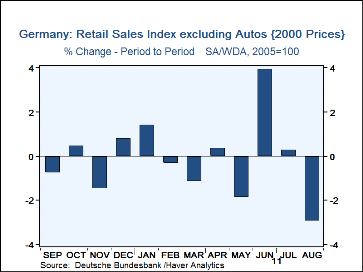 Global| Sep 30 2011
Global| Sep 30 2011German Retail Sales Go Erratic and Stay Weak
Summary
German retail sales took a sharp turn lower in August. Vehicle registrations were lower as well. Real retail sales excluding autos fell sharply in August as well. Nominal retail ex-auto sales are actually on a modest accelerating [...]
 German retail sales took a sharp turn lower in August. Vehicle registrations were lower as well.
Real retail sales excluding autos fell sharply in August as well. Nominal retail ex-auto sales are actually on a
modest accelerating profile. But because of the erratic month-to-month changes it is hard to take the trends seriously.
Germany’s sales acceleration is importantly dependent on a large spike in June sales and one that is just about to exit
the three-month growth calculation leaving near term momentum much weaker unless September sales are a real upside surprise.
German retail sales took a sharp turn lower in August. Vehicle registrations were lower as well.
Real retail sales excluding autos fell sharply in August as well. Nominal retail ex-auto sales are actually on a
modest accelerating profile. But because of the erratic month-to-month changes it is hard to take the trends seriously.
Germany’s sales acceleration is importantly dependent on a large spike in June sales and one that is just about to exit
the three-month growth calculation leaving near term momentum much weaker unless September sales are a real upside surprise.
The UK and Spain are experiencing the same sort of erratic behavior in retail sales. Like Germany, sales are erratically improving in the UK but they are on a clear deteriorating path in Spain. Because of the uneven pattern of sales we cannot be sure where trends are headed. And we continue to get various bits of data that surprise us. Still, unfolding events in the Zone give us a clearer picture of the likely path and likely risks and they still seem to be on the downside.
Even so, Europe is proving to have some resiliency. The Zone’s unemployment rate was steady in August, holding at 10% for the third consecutive month with the numerical total of the unemployed dropping by 38,000. Despite all sorts of gyrations and uncertainties in Italy, its rate of unemployment fell in July by one notch from 8% to 7.9%. German unemployment fell in September.
While the labor market is famous for its lagging behavior, the Euro-Area countries continue to come up with surprises. The truly troubled countries continue to be weak and to have trouble: Greece, Portugal, Spain, and Ireland. But Italy has been on the cusp of trouble and has seen its ability to launch effective government bond auctions impeded. Still it has posted a drop in its rate of unemployment.
The mostly likely situation is that the labor market is simply playing out its usual role as a laggard and even with its continued ‘good news’ weakness continues to encroach. The Manufacturing and Services PMIs for EMU continue to decay and to point the way lower. But as of August retail sales are still showing enough life over recent months to hold the three month growth rates up and the labor markets still had some upside surprises too. With inflation in the Zone having spurted unexpectedly in September the ECB has a tougher path on monetary policy to accompany its well-known dilemma over broader issues of systemic irregularities in the euro-Zone.
| German Real and Nominal Retail Sales | ||||||||
|---|---|---|---|---|---|---|---|---|
| Nominal | Aug-11 | Jul-11 | Jun-11 | 3Mo | 6Mo | 12Mo | YrAgo | QTR SAAR |
| Retail Ex auto | -3.0% | 0.0% | 3.9% | 3.2% | -2.5% | 0.3% | 3.8% | 1.8% |
| Car Registrations (units) | -1.2% | 18.7% | -15.9% | -5.3% | -4.2% | 15.0% | -30.0% | 0.0% |
| Real | Aug-11 | Jul-11 | Jun-11 | 3-MO | 6-MO | 12-MO | 3.8% | SAAR |
| Retail Ex auto | -2.9% | 0.3% | 4.0% | 5.1% | -2.6% | -1.0% | 2.9% | 3.9% |
| Other Early Reporters | ||||||||
| UK Nominal | 0.0% | 0.8% | 0.3% | 4.6% | 3.0% | 4.7% | 2.3% | 3.1% |
| UK real | -0.2% | 0.2% | 0.7% | 2.6% | 1.3% | 0.1% | 0.8% | 0.7% |
| Spain Retail XAuto | -1.5% | 2.1% | -2.5% | -7.3% | -5.8% | -2.6% | 0.7% | -5.2% |
Robert Brusca
AuthorMore in Author Profile »Robert A. Brusca is Chief Economist of Fact and Opinion Economics, a consulting firm he founded in Manhattan. He has been an economist on Wall Street for over 25 years. He has visited central banking and large institutional clients in over 30 countries in his career as an economist. Mr. Brusca was a Divisional Research Chief at the Federal Reserve Bank of NY (Chief of the International Financial markets Division), a Fed Watcher at Irving Trust and Chief Economist at Nikko Securities International. He is widely quoted and appears in various media. Mr. Brusca holds an MA and Ph.D. in economics from Michigan State University and a BA in Economics from the University of Michigan. His research pursues his strong interests in non aligned policy economics as well as international economics. FAO Economics’ research targets investors to assist them in making better investment decisions in stocks, bonds and in a variety of international assets. The company does not manage money and has no conflicts in giving economic advice.
More Economy in Brief
 Global| Feb 05 2026
Global| Feb 05 2026Charts of the Week: Balanced Policy, Resilient Data and AI Narratives
by:Andrew Cates






